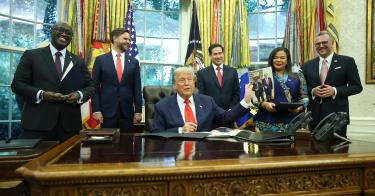Last month, the Trump administration hosted the signing of a peace agreement to resolve one of the world’s longest-standing conflicts between the Democratic Republic of the Congo and Rwanda. The agreement, brokered by the United States with support from Qatar, is expected to announce commitments to resolve decades-long issues on disarmament, border integrity, paramilitary groups, economic integration, and the return of refugees and humanitarian access to the region.
This is a historic moment for two African states eager to transition into a new era of stability and prosperity, and an opportunity to signal to the world where the continent’s future is focused. This agreement is also evidence of where President Trump is focused: facilitating the mechanics and politics to end “endless wars” and welcome an era of peace for those who want it.
Throughout his campaign, President Trump promised a commitment to peace—determined to continue the successes from his first term, like the Abraham Accords, which confronted generational issues with a bold, American-led declaration. His second term has opened a pathway for mediation for countries willing to lean into America’s unique role as peacemaker. Every deliberation is different and results are rarely immediate, of course, but at present, the U.S.-led negotiation between the Congo and Rwanda is commendable.
>>> Russia’s Libya Push Should Alarm the U.S. and Europe
In a moment that should enjoy bipartisan acclaim, this peace agreement signing is the result of an effective presidency and is significant for several reasons.
First, the deal provides resolution to a conflict underway for more than 30 years, one marked by the 1994 Rwandan genocide of nearly 1 million ethnic Tutsis and continuing since to encompass fighting over territory, security and control of natural resources. The violence (or continuous threat thereof) stunted any sense of stability for an Eastern Congolese region facing issues like food insecurity and infrastructure challenges, and susceptible to an ever-present Ebola risk. The peace agreement can be a difference-maker to address these issues, and offers real potential for the region’s development aspirations.
Second, the agreement underscores the White House’s commitment to a campaign promise in pursuing an end to the world’s ongoing wars. This is particularly important to Africa, where clashes elsewhere impact U.S. national and economic security interests and create the conditions for terrorism, extremism, famine and migration crises. Though the U.S. may not play a role in every situation, the Congo-Rwanda example demonstrates that the U.S. can productively engage in any situation where parties are willing.
Third, the process in which the deal was achieved establishes a workable blueprint for peacebuilding. The most recent outburst of fighting in January 2025 was met by the returning administration with a swift, coordinated response: the Departments of State and Treasury took corresponding action through statements, sanctions, special appointments and commercial diplomacy to curb violence, identify common space, and open dialogue. Any peace process is a slough, and the complexity of issues between the Democratic Republic of the Congo and Rwanda were both generational and personal. But the administration met this challenge through an effective whole-of-government approach that can be replicated in future efforts.
>>> Countering China’s Economic Warfare
Finally, the peace agreement anticipates both countries accommodating U.S. commercial interests in the region—specifically, critical minerals access. This region holds significant natural resources and mineral reserves required for technology development, including cobalt, lithium, tantalum and tungsten, key supply chain components used in the manufacturing of batteries, electronics, defense products, aerospace and other advanced technologies.
Historically, the ongoing conflict discouraged U.S. private-sector investment in mining operations, processing facilities and necessary infrastructure upgrades. Establishing a sense of security, the peace agreement presents a fundamental building block to mitigate that risk and eventually create avenues for U.S. investment and critical mineral resources access for American manufacturers. The agreement will reinforce the U.S. government’s investment in regional infrastructure as well, and could promote additional market alignment that would facilitate even greater U.S. private-sector participation.
The DRC and Rwanda will ultimately be responsible for the peace agreement’s longevity. But the prospect for such is strong—and reinforced by commercial promise and a White House that leads in its commitment to peace through strength. Coming together for peace is a hard-fought, remarkable development that should be readily celebrated. For the Trump administration, and for all those at the negotiating table, this moment is an undeniable win.
This piece originally appeared in The Hill on July 2, 2025



